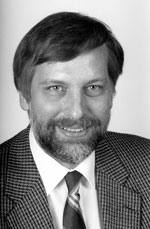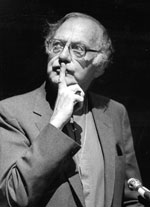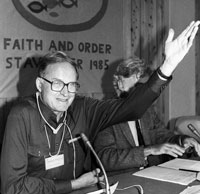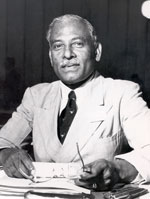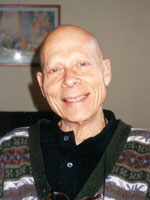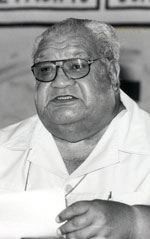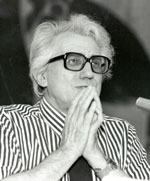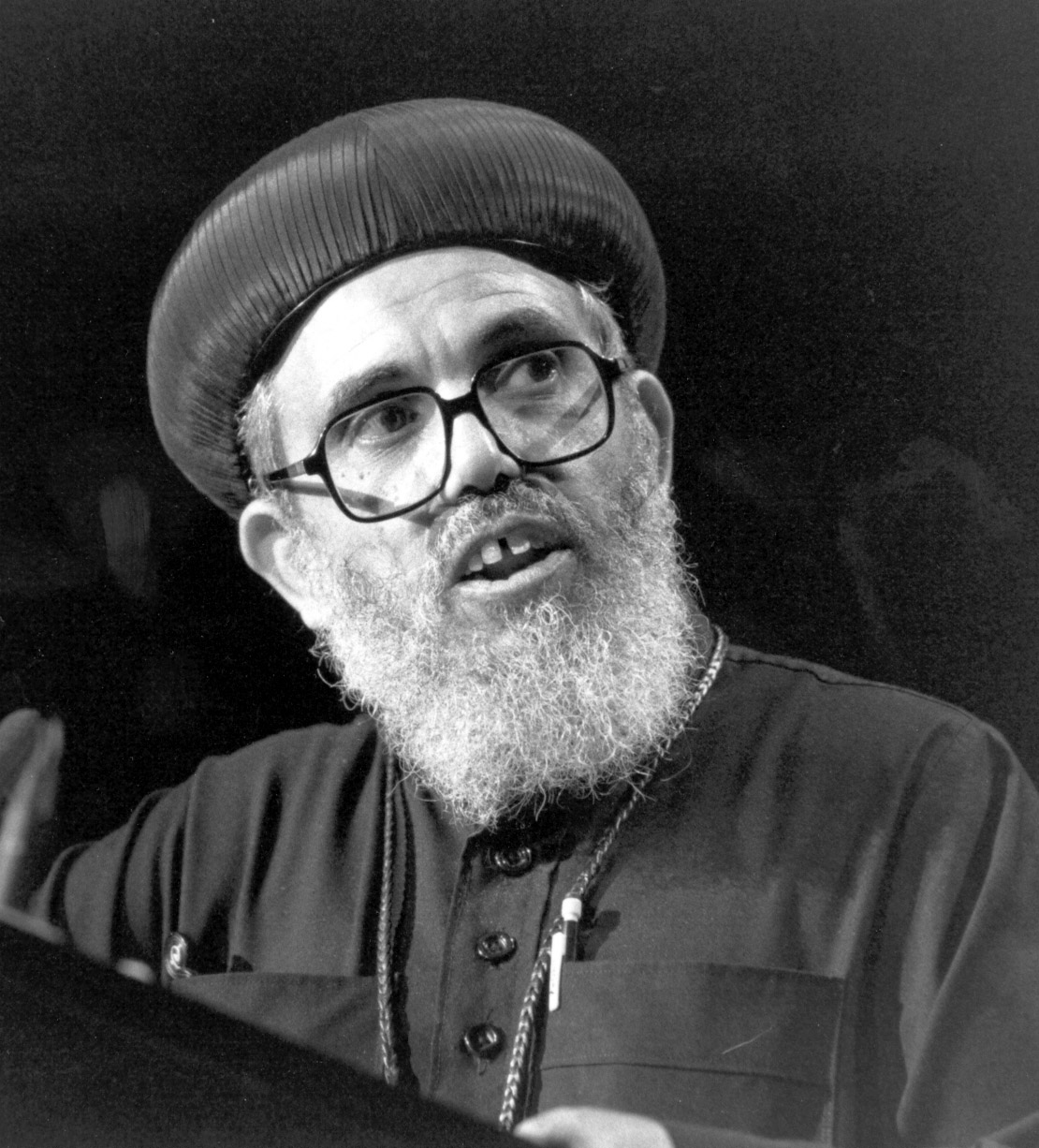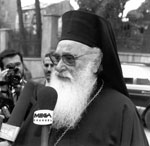
2000: The year in review
OBITUARIES
OBITUARIES
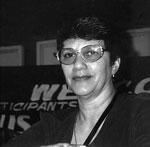
A well-known Latin American lay Protestant leader, Luis E. Odell Hodgson, died on 22 January in Barcelona, Spain, at the age of 88. After representing Argentina at the first world conference of Christian youth at Amsterdam in 1939, Odell Hodgson helped found the Union of Latin American Evangelical Youth in 1941, and served as its vice-chair from 1944 to 1955. He went on to play a significant role in his church in both Uruguay and Argentina as well as in the wider ecumenical movement and, from 1973 to 1975, served as the first lay president of the Methodist Church in Uruguay.
Te Ruakawhena Winiata from Aotearoa-New Zealand, who died on 17 April, was a staff member of Te Taha Maori of Te Haahi Weteriana O Aotearoa (the Methodist Church of Aotearoa-New Zealand). Te Ruakawhena Winiata inspired and helped develop the WCC’s Indigenous Peoples’ Programme and its focus on land and spirituality.
The executive editor for WCC publications, Marlin VanElderen, died suddenly on 12 June at the age of 54. During his 18 years’ service in Geneva as the author and editor of several key ecumenical books, the monthly magazine One World and the journal The Ecumenical Review, VanElderen was a key interpreter of the WCC’s mission and vision. He was a member of the Christian Reformed Church in North America.
Robert Runcie, the retired 102nd archbishop of Canterbury from 1980 to 1991 and head of world Anglicanism, died on 11 July at the age of 79. A leading academic, Runcie was also outspoken on social and ecclesial issues. He hosted an historic visit by Pope John Paul II to Canterbury cathedral in 1982, and promoted closer relations between the two churches.
John W. Deschner, who died on 28 July at the age of 77, was professor emeritus of Christian doctrine at Southern Methodist University in Dallas, Texas, USA. A vice-moderator of the WCC’s Faith and Order Commission from 1975 to 1983, and its moderator from 1983 to 1991, Deschner sought agreement on such key studies as “Confessing the Apostolic Faith”, “The Community of Men and Women in the Church”, and “Church and World”.
As vice-moderator of the WCC central committee from 1966 to 1968, Joshua Russell Chandran helped open the way for new voices from third-world churches to be heard at the Council’s watershed fourth assembly in Uppsala in 1968. His many contributions to ecumenism included his participation in the foundation of the Ecumenical Association of Third World Theologians, his efforts to build up the United Theological College in Bangalore, India, his work as first secretary of the Joint Council of the CSI, CNI, and Mar Thoma Church in India, and his 25-year-long involvement in the work of the WCC’s Faith and Order commission. Chandran died on 27 September aged 82.
A pastor of the Reformed Church of France, Alain Blancy had fled Nazi persecution as a child. He taught at several French Protestant institutions before becoming assistant director of the WCC’s Ecumenical Institute at Bossey from 1971 to 1981. Blancy was the co-president of the Groupe des Dombes, which brings together Protestant and Roman Catholic theologians from France and Switzerland. Blancy died on 30 September aged 73.
Sione Amanaki Havea, the first chairman of the Pacific Conference of Churches (1966-71) died on 25 October. Havea exerted a strong influence on the development of an ecumenical vision in the Pacific. It was at the 1983 sixth assembly of the WCC that, speaking about the search for a Pacific contextual theology, he said: “Wheat and grapes, bread and wine, are foreign to us. Today, it is the coconut. We see the kairos in the ripening of the coconut.” Many ecumenically minded people from the “liquid continent” now affirm a “coconut theology”. Havea was a member of the WCC Programme for Theological Education working group from 1979 to 1983.
A consultant to the Pontifical Council for Promoting Chistian Unity, Roman Catholic priest Jean-Marie Roger Tillard, OP, was involved in most of the significant ecumenical developments in his church. His most important writing was in ecclesiology, with major studies on The Bishop of Rome and The Church as Communion. Fr Jean became a deeply committed ecumenist especially through his experience in the Anglican-Roman Catholic International Commission (ARCIC) (1968-2000), and this commitment was further expressed through his work with the Disciples of Christ (1977-2000), the Orthodox-Roman Catholic Commission (1980-2000), and the WCC’s Faith and Order commission (1975-2000). In the latter capacity, he was a major influence in the drafting of the convergence texts Confessing the One Faith: An Ecumenical Explication of the Apostolic Faith and The Nature and Purpose of the Church. He died on 13 November at the age of 73.
Bishop Athanasios of the Coptic Orthodox Church of Egypt died on 16 November. Ordained as bishop of Beni-Souef in 1962, Athanasios was a member of the WCC’s central and executive committees from 1983 to 1991. An active ecumenical leader who established strong relationships with Christian and non-Christian organizations around the world, Bishop Athanasios emphasized the role of the church in community development and founded a Coptic organization for services and training in this area, a comprehensive development office and retreat and training centres.
A leading light of world mission in the Episcopal Church in the USA, Charles Henry Long, Jr, died on 17 November aged 77. A missionary in China from 1954 to 1958, he was secretary of the World Christian Student Federation from 1958 to 1960 and, from 1973 to 1978, executive secretary of the New York office of the WCC.
A car accident on 6 December took the lives of two Indian ecumenical leaders, Vinod A.R. Peter, president of the National Council of Churches in India and moderator of the Church of North India, and Gerald Andrews, bishop of the Eastern Himalaya diocese of the CNI. Peter was a member of several ecumenical bodies both in India and abroad, including the Lambeth Conference of the Anglican communion.
Patriarch Diodoros I of the Greek Orthodox Church in Jerusalem died on 19 December. Before his appointment as patriarch, he was the bishop of the Greek Orthodox Church in Amman, Jordan, for thirty years, where he built new churches and schools and organized pastoral care for Palestinian youth and refugees. In Jerusalem, he was a powerful voice for ecumenical commitment at the local level, addressing issues of common concern and advocating for peace and justice in the region.
